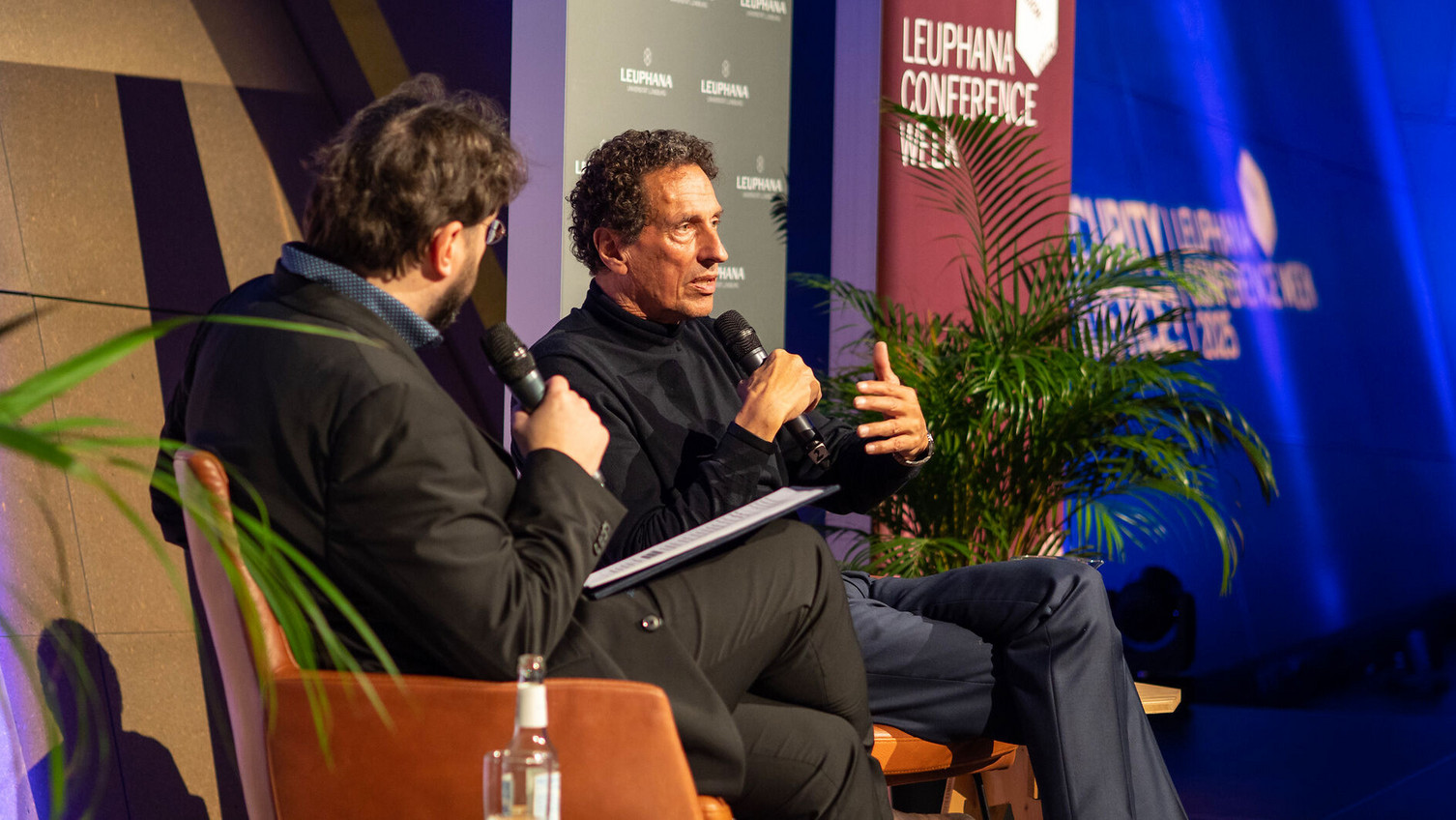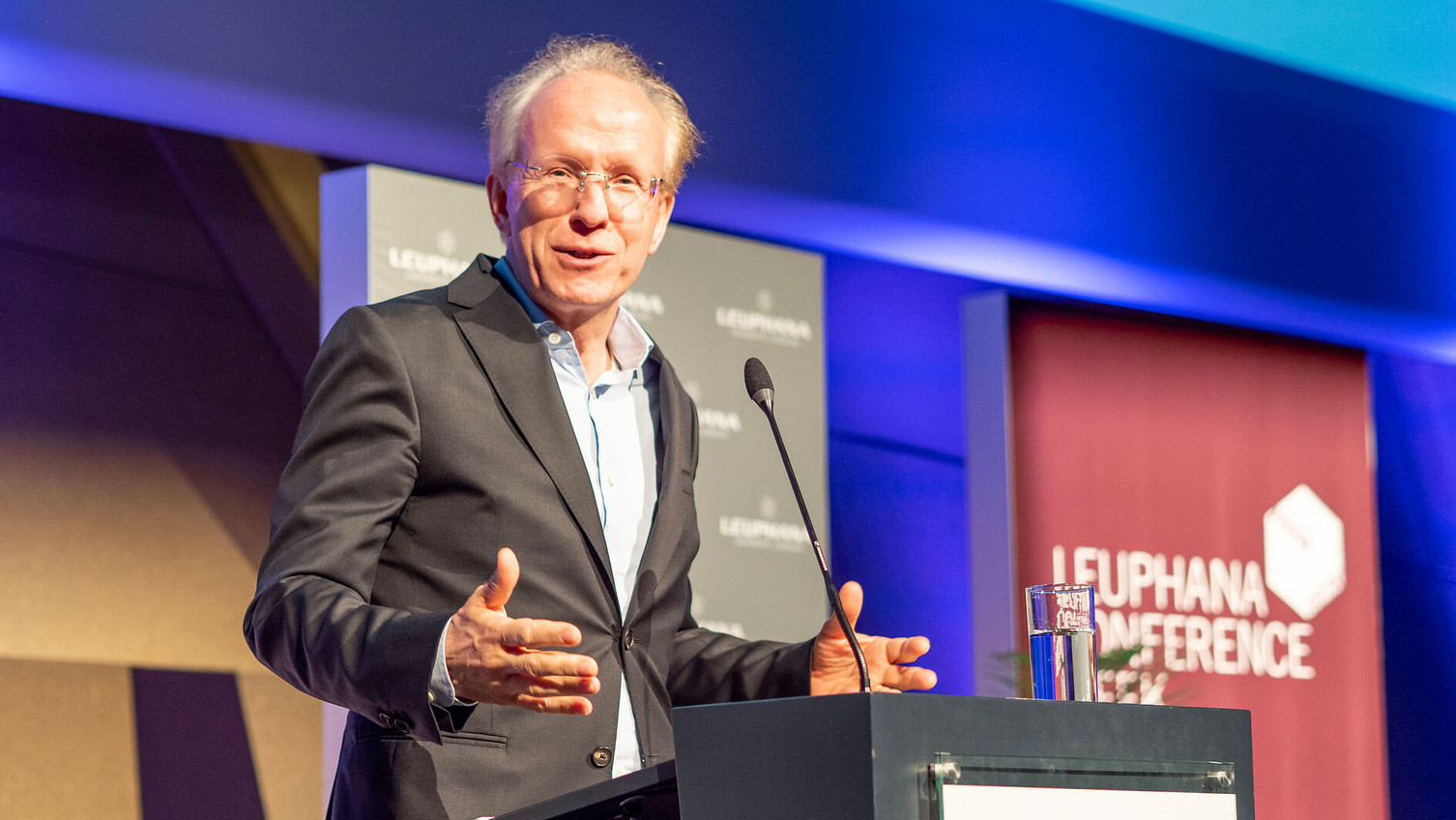Opening of Conference Week 2025: Demanded Science
2025-02-28 With the conference week, the approximately 1,500 first-semester students at the college will conclude the Leuphana semester and present their results from the module “Science Takes Responsibility”. At this year's opening, the renowned philosopher and former Minister of State for Culture Julian Nida-Rümelin explored the field of tension between security and justice.
Julian Nida-Rümelin turns to the screen in the central building. The motto of this year's conference week is written there: Security or Justice?: “This juxtaposition, which the title suggests, is absurd. That's clear to everyone. But if you look closely at where it is particularly absurd, then there is actually this conflict,” Julian Nida-Rümelin classifies. He points to countries with inefficient administrations, where police officers, for example, are underpaid and thus more susceptible to corruption: “There, the rich buy security, as in the gated communities in Brazil. The rich don't need state-organized security.” He pointed out the injustice: “But the people who cannot afford it depend on internal security, that is, on a functioning police force. Security is a basic prerequisite for justice.”
Julian Nida-Rümelin held the chair of philosophy and political theory at the Ludwig Maximilian University of Munich until 2020. His areas of specialization are decision theory and rationality theory, theoretical and applied ethics, political philosophy and epistemology. This is not the first time that the former deputy chair of the German Ethics Council has been to Lüneburg; he still remembers the central building from when it was a shell: “Some universities have great buildings, mostly from the 19th century. But there is none like this; it is unique. This conference seems to me to be just as unique. I had no idea that there were 1,500 people outside. I expected a more manageable number. I am doubly and triply impressed,” admits Julian Nida-Rümelin.
This year, the conference week is particularly busy. For the first time, prospective students are also invited this year to get a taste of Leuphana's unique study model.
“Welcome to Conference Week 2025, welcome to your Conference Week, because you will be helping to shape a large part of this event,” says the Leuphana President Sascha Spoun in his welcome address to the first-semester students in the auditorium. In his speech, he referred to the recent federal election and the rise of the AfD. He says that science is needed now more than ever: “How do we move from a sense of security to a robust concept of security that makes it possible to create security in a calm and prudent manner? Fear-driven panic is no basis for effective security precautions. If we don't make an effort to work out where the dangers and risks are and where they are not, based on facts and ultimately that means scientifically, then panic and scaremongering will continue,” warns Sascha Spoun.
He emphasizes the importance of transdisciplinarity. “That is precisely why the conference week is not a purely scientific conference. It is decidedly dedicated to the idea of making the scientific socially acceptable to some extent by also orienting it towards the everyday and the concrete.”
During the conference week, the students took on the roles. The performance on the conflict between security and justice received great applause. Around 20 students portrayed the dissent with their voices and bodies and showed how a society can be divided by feelings. All first-semester students have dealt scientifically with real-world problems in 44 seminars and 255 project groups during the Leuphana semester.
Beeke Kröger, Rieke Neumann, Johanna Bösel-Ded, Emily Riske and Vincent Poersch are also taking part. The five first-semester students have been working on sustainable consumption in a seminar on participatory research: together with the “foodsharing Lüneburg” initiative and the “Commons Zentrum” citizens' meeting, they have developed a Fairteiler. They are presenting their results during the conference week, along with all the other student groups: “We started by studying the literature and looking at what we needed to consider if we wanted to make the collection point inclusive,” explains Beeke Kröger. The 21-year-old is studying cultural studies at the college.
The food donations in the wooden cupboard should be accessible to everyone. After the literature research, the groups met with a mixed team from the initiative and the community center. Using a transdisciplinary approach, in this case implemented with the method of participatory action research, the students not only determined the needs of the citizens' meeting place and the initiative, but also ensured a change in the non-profit center: “We built the Fairteiler in such a way that it is both accessible to wheelchair users and illuminated, in order to provide more security, especially for women,” explains Johanna Bösel-Ded. She is studying environmental science.
During the Gallery Walk in the foyer of the central building, the five answer questions from their fellow students from the responsibility module. Students are standing at their project stands everywhere, exchanging their results and classifying them into the UN Sustainable Development Goals. “It was an exciting semester with open exchange and a great group,” says teaching student Vincent Poersch.


